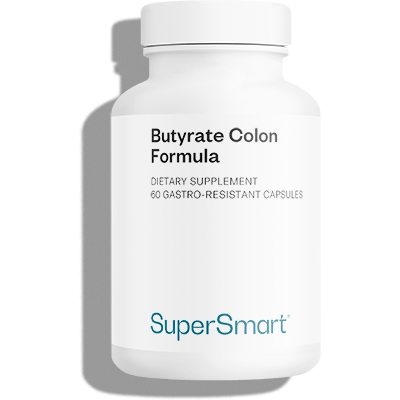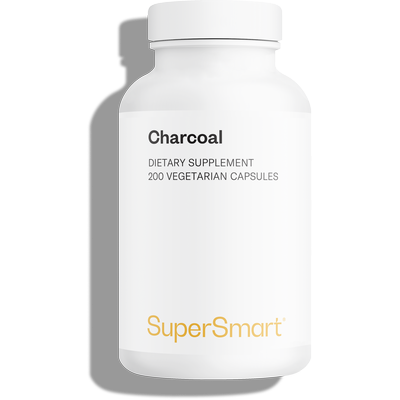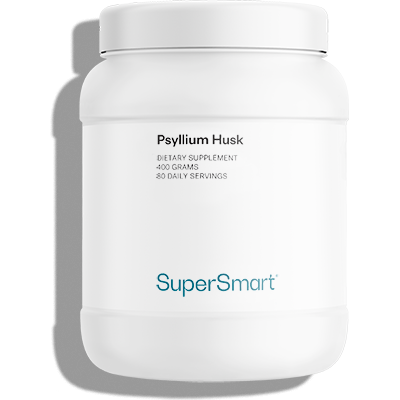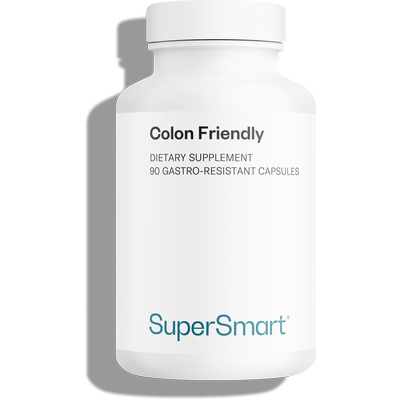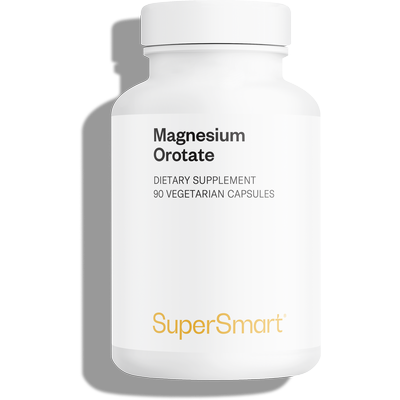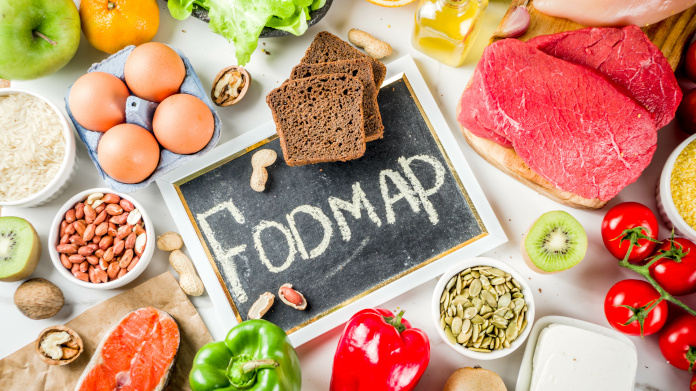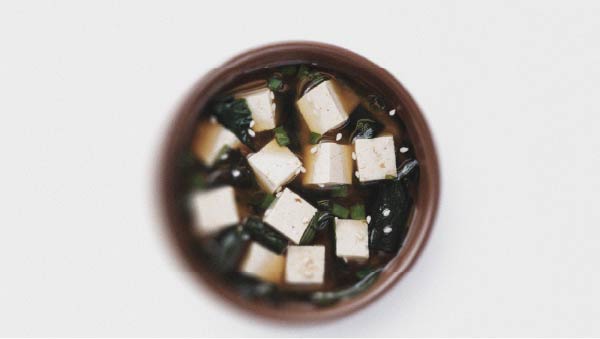List of foods that don't ferment in the intestine
Is flatulence and/or bloating ruining your life? Discover the list of foods that ferment the least in the intestine to adjust your plate.

Intestinal fermentation: a natural phenomenon
The first thing to remember is that fermentation is a perfectly normal physiological process.
It results from the breakdown of dietary fibre and other non-digestible carbohydrates by the bacteria of the microbiota when they reach the large intestine.
It then leads to the production of gases (nitrogen, hydrogen, methane, carbon dioxide, etc.) as well as beneficial metabolites such as short-chain fatty acids (SCFAs), which nourish the colonocytes, the cells in the colon (1).
In this sense, fermentation is not a problem in itself. But when it becomes excessive, it can cause digestive discomfort that can seriously affect quality of life.
Excessive fermentation: what are the symptoms?
Excessive fermentation causes a massive build-up of gas in the intestine, leading to:
- abdominal distension and bloating (2);
- flatulence, often foul-smelling;
- painful intestinal spasms;
- transit disorders (diarrhoea, constipation, or alternation of the two).
These symptoms are particularly marked in people with irritable bowel syndrome (IBS) and/or sensitivity to FODMAPs, fermentable sugars that are poorly absorbed by the small intestine (3-4).
Common causes of excessive fermentation
Several factors encourage excessive fermentation in the intestine:
- a diet too rich in fibre and fermentable carbohydrates (FODMAPs);
- an imbalance in the microbiota (intestinal dysbiosis);
- chronic stress that affects intestinal motricity (5);
- visceral hypersensitivity, frequently associated with IBS (6);
- inadequate mastication (7);
- certain specific food intolerances, notably lactose or gluten (8–9).
One of the most effective ways of countering this phenomenon is to review your diet, giving priority to foods that ferment little or not at all in the intestine.
The list of foods that do not ferment in the intestine
The following foods are low in fermentable compounds, making them generally well tolerated by sensitive intestines (10):
- eggs;
- lean meat (chicken, turkey, veal, rabbit, etc.);
- white fish (cod, hake, sole, pollack, etc.);
- refined starches (white rice, white pasta, white bread, etc.);
- naturally gluten-free cereals (quinoa, buckwheat, millet, polenta, etc.), potatoes, sweet potatoes;
- clarified butter (ghee), olive oil, coconut oil;
- fruit low in FODMAPs: citrus fruit, bananas, strawberries, raspberries, passion fruit, papaya, kiwi fruit, melons, mandarins, rhubarb, coconuts;
- vegetables low in FODMAPs: spinach, carrot, chicory, olives, celery, courgette, cucumber, salad;
- lactose-free dairy products such as mature hard cheeses (comté, emmental, beaufort, parmesan, etc.), plant-based drinks and yoghurts (coconut, soya, almond, rice);
- maple syrup;
- coffee, tea and herbal teas.
Note that cooking methods also affect the digestibility of food. Wherever possible, gentle methods, such as poaching, steaming or stewing should be used.
Swollen belly: which foods to avoid?
Conversely, certain foods are known to ferment excessively in the gut (11):
- cabbage and alliaceous vegetables (onions, garlic, leeks, etc.);
- sources of fructose (honey, certain fruits such as apples and pears);
- high-fat meats and cold meats;
- legumes;
- wholegrain products, especially those made from wheat;
- lactose-rich dairy products such as milk and fromage frais;
- fizzy drinks;
- sweeteners (polyols) contained in chewing gum, low-fat products, etc.
It's not necessarily a question of eliminating them completely, but rather of moderating their consumption (in terms of frequency and/or quantity) in order to assess individual tolerance.
What supplements can help relieve fermentation-related problems?
In addition to these dietary measures, certain targeted food supplements help to reduce excessive fermentation, regulate transit and provide more general support for the intestinal mucosa.
Often considered a 'natural intestinal dressing', activated vegetable charcoal helps to reduce excess flatulence after meals (12).
With its spongy structure, it has adsorbent properties that enable it to bind intestinal gases and prevent their accumulation in the colon (extracted naturally from a resinous wood, Charcoal is activated to form a network of ultra-fine pores, guaranteeing superior effectiveness).
Several studies have observed disturbances in the microbiotic composition of IBS sufferers, who are particularly prone to bloating and transit problems (13).
In this context, a probiotic combining strains active in the lower tract (such as Colon Friendly, which combines Saccharomyces cerevisiae, Bifidobacterium longum infantis, Bifidobacterium longum longum and Lactobacillus acidophilus) may help to restore a healthy intestinal balance (14).
Butyrate is one of the valuable short-chain fatty acids mentioned above.
Derived mainly from the fermentation of dietary fibres, it is thought to help strengthen the intestinal barrier by fusing the tight junctions that line the walls (15).
Studies also suggest that it plays a key role in modulating intestinal inflammation (16). The problem is that its synthesis varies greatly from one individual to another, and is thought to be considerably reduced in the case of irritable bowel, hence the importance of external supplementation (Butyrate Colon Formula is based on tributyrin, an optimised, highly assimilable form of butyrate) (17).
Since the discovery of the gut–brain communication axis, researchers have suspected a close link between functional digestive disorders, such as IBS, and stress (18).
Because it contributes to the normal functioning of the nervous system and muscles, magnesium is an interesting option in the case of intestinal spasms linked to nervous 'hyperactivity' (the magnesium orotate at the heart of Magnesium Orotate is a highly bioavailable form that is very well accepted at digestive level) (19).
Finally, soft, non-fermentable soluble fibres such as those found in blond psyllium (featured in Psyllium Husk) help to harmonise transit gently, i.e. without inducing overproduction of gas, and to restore intestinal comfort (20-21).
SUPERSMART ADVICE
References
- Macfarlane GT, Macfarlane S. Fermentation in the human large intestine: its physiologic consequences and the potential contribution of prebiotics. J Clin Gastroenterol. 2011 Nov;45 Suppl:S120-7. doi: 10.1097/MCG.0b013e31822fecfe. PMID: 21992950.
- Seo AY, Kim N, Oh DH. Abdominal bloating: pathophysiology and treatment. J Neurogastroenterol Motil. 2013 Oct;19(4):433-53. doi: 10.5056/jnm.2013.19.4.433. Epub 2013 Oct 7. PMID: 24199004; PMCID: PMC3816178.
- Ringel-Kulka T, Choi CH, Temas D, Kim A, Maier DM, Scott K, Galanko JA, Ringel Y. Altered Colonic Bacterial Fermentation as a Potential Pathophysiological Factor in Irritable Bowel Syndrome. Am J Gastroenterol. 2015 Sep;110(9):1339-46. doi: 10.1038/ajg.2015.220. Epub 2015 Aug 25. PMID: 26303129; PMCID: PMC4983766.
- Wong WM. Restriction of FODMAP in the management of bloating in irritable bowel syndrome. Singapore Med J. 2016 Sep;57(9):476-84. doi: 10.11622/smedj.2016152. PMID: 27664186; PMCID: PMC5027396.
- Madison A, Kiecolt-Glaser JK. Stress, depression, diet, and the gut microbiota: human-bacteria interactions at the core of psychoneuroimmunology and nutrition. Curr Opin Behav Sci. 2019 Aug;28:105-110. doi: 10.1016/j.cobeha.2019.01.011. Epub 2019 Mar 25. PMID: 32395568; PMCID: PMC7213601.
- Farzaei MH, Bahramsoltani R, Abdollahi M, Rahimi R. The Role of Visceral Hypersensitivity in Irritable Bowel Syndrome: Pharmacological Targets and Novel Treatments. J Neurogastroenterol Motil. 2016 Oct 30;22(4):558-574. doi: 10.5056/jnm16001. PMID: 27431236; PMCID: PMC5056566.
- Mercier P, Poitras P. Gastrointestinal symptoms and masticatory dysfunction. J Gastroenterol Hepatol. 1992 Jan-Feb;7(1):61-5. doi: 10.1111/j.1440-1746.1992.tb00937.x. PMID: 1543871.
- Cenni S, Sesenna V, Boiardi G, Casertano M, Russo G, Reginelli A, Esposito S, Strisciuglio C. The Role of Gluten in Gastrointestinal Disorders: A Review. 2023 Mar 27;15(7):1615. doi: 10.3390/nu15071615. PMID: 37049456; PMCID: PMC10096482.
- Malik TF, Panuganti KK. Lactose Intolerance. [Updated 2023 Apr 17]. In: StatPearls [Internet]. Treasure Island (FL): StatPearls Publishing; 2025 Jan-. Available from: https://www.ncbi.nlm.nih.gov/books/NBK532285/
- Galgano F, Mele MC, Tolve R, Condelli N, Di Cairano M, Ianiro G, D'Antuono I, Favati F. Strategies for Producing Low FODMAPs Foodstuffs: Challenges and Perspectives. 2023 Feb 17;12(4):856. doi: 10.3390/foods12040856. PMID: 36832931; PMCID: PMC9956220.
- Syed K, Iswara K. Low-FODMAP Diet. [Updated 2023 Sep 4]. In: StatPearls [Internet]. Treasure Island (FL): StatPearls Publishing; 2025 Jan-. Available from: https://www.ncbi.nlm.nih.gov/books/NBK562224/
- Jain NK, Patel VP, Pitchumoni CS. Efficacy of activated charcoal in reducing intestinal gas: a double-blind clinical trial. Am J Gastroenterol. 1986 Jul;81(7):532-5. PMID: 3521259.
- Lajoie F, Rousseau G, Blanquet-Diot S, Etienne-Mesmin L. Syndrome de l’intestin irritable - Rôle du microbiote intestinal [Irritable bowel syndrome: Role of gut microbiota]. Med Sci (Paris). 2021 Jun-Jul;37(6-7):593-600. French. doi: 10.1051/medsci/2021095. Epub 2021 Jun 28. PMID: 34180818.
- Dale HF, Rasmussen SH, Asiller ÖÖ, Lied GA. Probiotics in Irritable Bowel Syndrome: An Up-to-Date Systematic Review. 2019 Sep 2;11(9):2048. doi: 10.3390/nu11092048. PMID: 31480656; PMCID: PMC6769995.
- Peng L, Li ZR, Green RS, Holzman IR, Lin J. Butyrate enhances the intestinal barrier by facilitating tight junction assembly via activation of AMP-activated protein kinase in Caco-2 cell monolayers. J Nutr. 2009 Sep;139(9):1619-25. doi: 10.3945/jn.109.104638. Epub 2009 Jul 22. PMID: 19625695; PMCID: PMC2728689.
- Recharla N, Geesala R, Shi XZ. Gut Microbial Metabolite Butyrate and Its Therapeutic Role in Inflammatory Bowel Disease: A Literature Review. 2023 May 11;15(10):2275. doi: 10.3390/nu15102275. PMID: 37242159; PMCID: PMC10221771.
- Yang N, Lan T, Han Y, Zhao H, Wang C, Xu Z, Chen Z, Tao M, Li H, Song Y, Ma X. Tributyrin alleviates gut microbiota dysbiosis to repair intestinal damage in antibiotic-treated mice. PLoS One. 2023 Jul 31;18(7):e0289364. doi: 10.1371/journal.pone.0289364. PMID: 37523400; PMCID: PMC10389721.
- Qin HY, Cheng CW, Tang XD, Bian ZX. Impact of psychological stress on irritable bowel syndrome. World J Gastroenterol. 2014 Oct 21;20(39):14126-31. doi: 10.3748/wjg.v20.i39.14126. PMID: 25339801; PMCID: PMC4202343.
- Gilca-Blanariu GE, Trifan A, Ciocoiu M, Popa IV, Burlacu A, Balan GG, Olteanu AV, Stefanescu G. Magnesium-A Potential Key Player in Inflammatory Bowel Diseases? Nutrients. 2022 May 3;14(9):1914. doi: 10.3390/nu14091914. PMID: 35565881; PMCID: PMC9102374.
- Ashraf W, Park F, Lof J, Quigley EM. Effects of psyllium therapy on stool characteristics, colon transit and anorectal function in chronic idiopathic constipation. Aliment Pharmacol Ther. 1995 Dec;9(6):639-47. doi: 10.1111/j.1365-2036.1995.tb00433.x. PMID: 8824651.
- Shulman RJ, Hollister EB, Cain K, Czyzewski DI, Self MM, Weidler EM, Devaraj S, Luna RA, Versalovic J, Heitkemper M. Psyllium Fiber Reduces Abdominal Pain in Children With Irritable Bowel Syndrome in a Randomized, Double-Blind Trial. Clin Gastroenterol Hepatol. 2017 May;15(5):712-719.e4. doi: 10.1016/j.cgh.2016.03.045. Epub 2016 Apr 11. PMID: 27080737; PMCID: PMC5064811.
Keywords
1 Days
Simple and quick :-)
My order was delivered quickly, and I'm satisfied with the product! It was lot less fuss compared with some things I've ordered.
DEL Jacqueline
1 Days
Excellent quality products & customer…
Excellent quality products & customer service & care …thank you!
Giovanna Escalera
3 Days
great experience
Easy ordering, fast deliver, very professionally.
Natasa
6 Days
this company and its products are…
this company and its products are perfect: I have been their customer for three years , prices are reasonable for the high quality they offer , the products are of very good quality not just plainly "normal" , delivery is quite fast. we are very satisfied with them.
Gabriel Diacakis
7 Days
TOP service TOP products will buy again…
TOP service TOP products will buy again and again
PINOTTI Giorgio
9 Days
Trustworthy company with tested products
Trustworthy company with tested products
Trusted
13 Days
Efficiency and speed
Efficiency and speed
Cuccie
15 Days
GOOD BRAND IN FOOD COMPLEMENTS
GOOD BRAND IN FOOD COMPLEMENTS - SERIOUS WITH GOOD DOCUMENTS AND DETAILS SCIENTIST. AND SERIOUS HONNEST COMMERZIALISATION. I HAVE TRUST IN THEIR PRODUCTS.
FENOGLIO Guy
16 Days
Very good experience
Very good experience, the products arrived in time, in perfect condition and are good quality. Thank you.
GABI TIRCOCI
22 Days
very good expereince
very good expereince
Jelena Đaković
22 Days
Very good products.
Very good products.
Agnes BENDSAK
24 Days
Just OK
Just OK, ordering from company for many years and being safisfied
Lynn Mae
25 Days
Recomendo
Produtos encomendados são recebidos atempadamente e de acordo com o anunciado! Muito satisfeita!
Carla Sofia
25 Days
Everything is great!
Everything is great!
Jonas
30 Days
The delivery was fast and the product…
The delivery was fast and the product is great
SOMMARIVA Gianni
of experience
your money back
##montant## purchase


